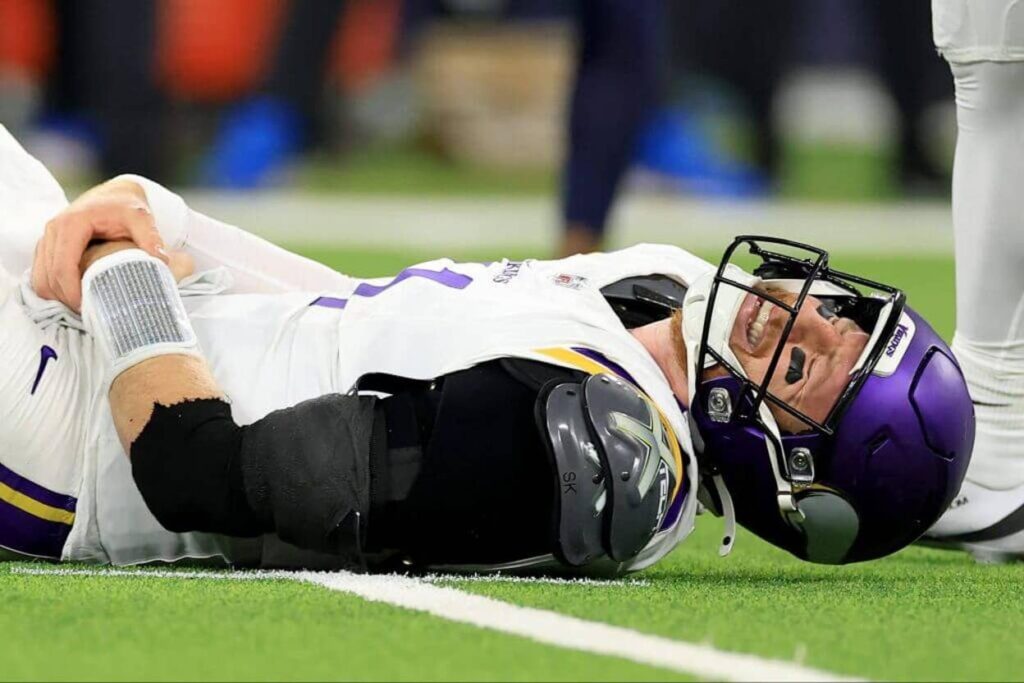INGLEWOOD, Calif. — Justin Jefferson gave it his all, but even his usual composure couldn’t mask the frustration. On the sideline during halftime of Thursday night’s matchup against the Los Angeles Chargers, Jefferson finally let his emotions show. The star receiver, typically reserved and self-contained, angrily tossed his helmet onto its perch before retreating alone toward the locker room. It was a rare glimpse into the disappointment felt by a team completely overwhelmed on both sides of the ball.
The 37-10 loss was more than just a defeat; it was a complete dismantling. The Vikings were outclassed in nearly every aspect of the game. Offensively, they struggled to run the ball and had trouble passing, as if caught in a relentless tidal wave of defensive pressure. Defensively, they offered almost no resistance to the Chargers’ high-powered offense. On special teams, penalties and mental errors compounded an already bleak performance.
Head coach Kevin O’Connell admitted after the game that Minnesota had been both outplayed and outcoached, while linebacker Blake Cashman described the effort more bluntly: “sloppy.” When asked to elaborate, Cashman laughed, the levity thin, before adding, “Where do I start?” The sentiment among players was clear—this performance was far from what they expected, even considering the superior talent on the other side of the field.
The Chargers came in with Justin Herbert at quarterback, arguably the best signal-caller in the league, while the Vikings had only posted wins against the Bears, Bengals, and Browns. Tension within the team has been noticeable since spring training, simmering through practices and preseason games, and it seems the challenges of this season are only amplifying the unease.
Safety and captain Josh Metellus tried to keep spirits grounded, asserting, “I’m not worried. I think we’ve got the right guys in this building, the right coaches, the right staff.” But Cashman was more candid, highlighting the team’s 3-4 record and the competitive nature of the NFC North, adding that the present moment feels like “staring down the barrel.”
Minnesota’s schedule offers little respite. The team faces the Detroit Lions next week, who have beaten the Vikings five consecutive times. Following that, they host a potentially healthy Baltimore Ravens squad led by Lamar Jackson, and they also have two games against the Green Bay Packers. Travel-heavy matchups in Seattle, Dallas, and New York loom, all after being thoroughly outgained 419-164 by the Chargers.
“In simpler terms, we just need to nut up,” Cashman said, reflecting the no-nonsense mindset needed to move forward. O’Connell emphasized fundamentals and execution as the core issues, but it’s clear that quarterback play has added another layer of complexity.
This offseason, the Vikings chose not to extend a significant contract to Sam Darnold and pursued Daniel Jones, who ultimately signed with the Colts. Aaron Rodgers’ name surfaced as a potential solution, but Minnesota ultimately decided to move forward with J.J. McCarthy as the starting quarterback. Meanwhile, Darnold, Jones, and Rodgers are thriving elsewhere, leaving McCarthy to develop on the field while navigating the challenges of a young roster.
Carson Wentz, who took over after McCarthy suffered a high-ankle sprain, played through pain Thursday night, wearing a bulky brace that made him resemble a certain comic book villain. Injuries on the offensive line—including Donovan Jackson’s broken wrist, Brian O’Neill’s sprained MCL, and Christian Darrisaw’s ongoing recovery from last year—have compounded the team’s struggles, forcing Wentz to absorb pressure while attempting to maintain offensive rhythm.
Defensively, the Vikings have been equally hampered. Absences of key players such as Andrew Van Ginkel, combined with underwhelming performances from Jonathan Allen, Javon Hargrave, and the secondary, have left them vulnerable. Mistakes like Dallas Turner’s late helmet launch against Herbert illustrate both frustration and a lack of discipline.
Beyond individual errors, broader organizational changes have impacted the team. O’Connell is now game-planning without Grant Udinski, who left for Jacksonville, and several defensive stalwarts from previous seasons—Cam Bynum, Harrison Phillips, Jonathan Bullard, and Stephon Gilmore—are no longer on the roster. The synergy and selflessness that defined Minnesota’s defense in prior years is noticeably absent.
As O’Connell pointed out, everything in football is interconnected. If the defense falters, the quarterback is exposed. If the offense can’t sustain drives, defensive schemes lose flexibility. Thursday night was a stark reminder of how quickly the momentum can shift from controlled competition to outright chaos.
“We need to own this,” O’Connell said. “This is not a bury-the-tape kind of time for our organization. This is watch it, view it, own it. Every coach, every player. It starts with me.”
As the Vikings’ traveling party left SoFi Stadium, O’Connell was among the last, walking with the director of security and safety, Dave Korus, and assistant Henry Schneider IV. The somber procession reflected the gravity of a night that may define the trajectory of Minnesota’s season—either as a turning point toward resilience or a cautionary tale of potential derailment.

